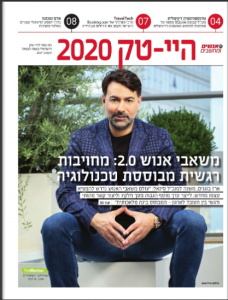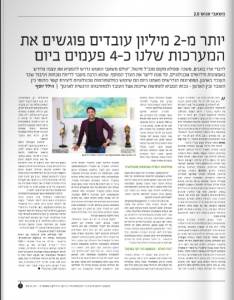Erez Buganim
Much has been written about the benefits of digitization and work from home to employees and employers alike. These include significant reductions in traffic jams and lost time on the roads, a reduction in air pollution and the use of pollutants including automotive fuels and aircraft. This as well as an increase in employee satisfaction and contribution to the respective organization.
And as in every field here too, there are beneficiaries and losers. We seem to be shackled and at the mercy of the crisis, but our conduct before, during the crisis and after will determine whether we will be the story’s big winner or big losers. If we will be able to take advantage of the disadvantages and grow from them or will we lose a lot.
In the pre-outbreak of the current Corona crisis, many organizations seemed to suffer from systemic complication and were not prepared to the change in the short and immediate term when, apparently, this had no effect on their profitability, then the Corona reached the forefront while allowing business survival only for those prepared and built for the change.
Thus, businesses were able to immediately transition to digital and move their operations and services to remote work were least affected.
When one small virus these days reveals the power or weakness of world economies as well as the ability of many organizations to deal with a crisis, we get a mirror image of the day after and of a slow and gradual process that we have long been witnessing – digitization of the services and trade. What Amazon has done to US malls and what we expect to happen to businesses that will not go digital, happens here to our eyes. Also, a fast-paced process that would take a decade in the world of medicine, arrived on the day of the Corona crisis and is already here. Predict that it will take between 6-10 years to the opinion of workforce organizations, there is now undergoing a drastic forecast change and expect the same changes to take place within 6-8 months.
In these days, the Israeli government, like many other governments, are opening their pockets in-depth, spreading billions at the national level and more than $ 8 trillion at the international level. This comes to unimaginable amounts that humanity has not foreseen in the past, in order to preserve the economy and its survival. At this point, the question arises is if we had acted differently before the Corona crisis, we would have needed grants of such magnitude. Needless to say, those billions of grants – we will be required to pay with an interest on routine days to come – and hopefully soon. Imagine, if we were prepared for a bit of a crisis, then we would have a more stable, safer and much less shocking economy.
Constraint and necessity are the ancestors of the invention. The human need to survive has caused the social evolution to grow and create during history, which of course allows the discovery of new ways of new growth engines. As a necessity, the widest experiment at work from home is currently being conducted in the world. Although the experiment is not carried out under optimal conditions for various reasons such as the children are present at home, stagnation in the markets arising from the complex situation, but its systemic advantages are still evident.
Imagine the day after continuing a similar pattern, a lot of remote workers enabling the reduction of employment inequality between the periphery and central cities, flow of traffic, savings in investment in transport infrastructure, traffic jams, steep declines and low air pollution, much less sick days, Occupational satisfaction that produces creativity alongside life-satisfaction of the employee and the company as a whole, which has a direct impact on GDP.
Just as we describe the Ultimate Employee Model as capable of adapting its capabilities to rapidly changing time requirements, so business owners must run a business plan that can make money from those existing resources and remain powerless in the face of the dilution of in the configuration demand. The billions in some parts of the world on the day after the crisis can find their way to organizations that will know how to reinvent themselves in the face of the Corona crisis when it passes. Thus, the all-inclusive tourism and airline companies would not have remained stagnant in the face of the crisis, if even before the Corona era they had created plans to divert resources such as flight – to other functional ways including cargo transfer and more. As micro-and macro-level businesses and companies – we need to know how to take our resources to manage demand wisely and in varied ways even in our daily lives so that crises like these will not fall on us on a clear day and also we will earn new channels of activity.
May we be educated to take out a sweet dare and preserve with us the benefits and the new world that we discovered long after the crisis ended.
The author of the article is the Deputy and Acting CEO of Synel MLL PayWay, which provides integrated hardware management solutions for employee management in the organization.
 +44 208 900 9991
+44 208 900 9991 +01 480-374-7770
+01 480-374-7770


